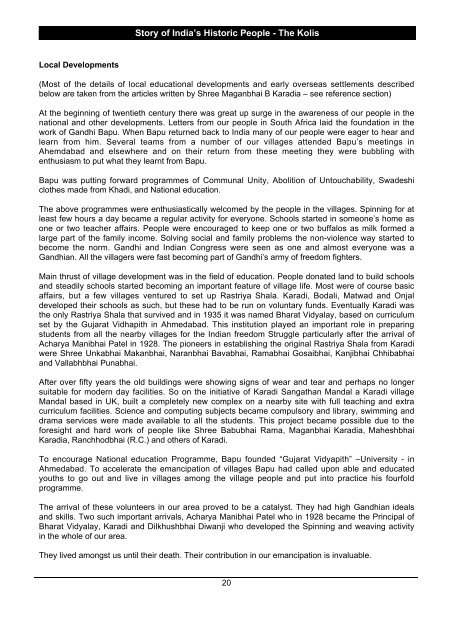THE ASSOCIATION OF MANDHATA SAMAJ UK - Mandhata Global
THE ASSOCIATION OF MANDHATA SAMAJ UK - Mandhata Global
THE ASSOCIATION OF MANDHATA SAMAJ UK - Mandhata Global
Create successful ePaper yourself
Turn your PDF publications into a flip-book with our unique Google optimized e-Paper software.
Local Developments<br />
Story of India’s Historic People - The Kolis<br />
(Most of the details of local educational developments and early overseas settlements described<br />
below are taken from the articles written by Shree Maganbhai B Karadia – see reference section)<br />
At the beginning of twentieth century there was great up surge in the awareness of our people in the<br />
national and other developments. Letters from our people in South Africa laid the foundation in the<br />
work of Gandhi Bapu. When Bapu returned back to India many of our people were eager to hear and<br />
learn from him. Several teams from a number of our villages attended Bapu’s meetings in<br />
Ahemdabad and elsewhere and on their return from these meeting they were bubbling with<br />
enthusiasm to put what they learnt from Bapu.<br />
Bapu was putting forward programmes of Communal Unity, Abolition of Untouchability, Swadeshi<br />
clothes made from Khadi, and National education.<br />
The above programmes were enthusiastically welcomed by the people in the villages. Spinning for at<br />
least few hours a day became a regular activity for everyone. Schools started in someone’s home as<br />
one or two teacher affairs. People were encouraged to keep one or two buffalos as milk formed a<br />
large part of the family income. Solving social and family problems the non-violence way started to<br />
become the norm. Gandhi and Indian Congress were seen as one and almost everyone was a<br />
Gandhian. All the villagers were fast becoming part of Gandhi’s army of freedom fighters.<br />
Main thrust of village development was in the field of education. People donated land to build schools<br />
and steadily schools started becoming an important feature of village life. Most were of course basic<br />
affairs, but a few villages ventured to set up Rastriya Shala. Karadi, Bodali, Matwad and Onjal<br />
developed their schools as such, but these had to be run on voluntary funds. Eventually Karadi was<br />
the only Rastriya Shala that survived and in 1935 it was named Bharat Vidyalay, based on curriculum<br />
set by the Gujarat Vidhapith in Ahmedabad. This institution played an important role in preparing<br />
students from all the nearby villages for the Indian freedom Struggle particularly after the arrival of<br />
Acharya Manibhai Patel in 1928. The pioneers in establishing the original Rastriya Shala from Karadi<br />
were Shree Unkabhai Makanbhai, Naranbhai Bavabhai, Ramabhai Gosaibhai, Kanjibhai Chhibabhai<br />
and Vallabhbhai Punabhai.<br />
After over fifty years the old buildings were showing signs of wear and tear and perhaps no longer<br />
suitable for modern day facilities. So on the initiative of Karadi Sangathan Mandal a Karadi village<br />
Mandal based in <strong>UK</strong>, built a completely new complex on a nearby site with full teaching and extra<br />
curriculum facilities. Science and computing subjects became compulsory and library, swimming and<br />
drama services were made available to all the students. This project became possible due to the<br />
foresight and hard work of people like Shree Babubhai Rama, Maganbhai Karadia, Maheshbhai<br />
Karadia, Ranchhodbhai (R.C.) and others of Karadi.<br />
To encourage National education Programme, Bapu founded “Gujarat Vidyapith” –University - in<br />
Ahmedabad. To accelerate the emancipation of villages Bapu had called upon able and educated<br />
youths to go out and live in villages among the village people and put into practice his fourfold<br />
programme.<br />
The arrival of these volunteers in our area proved to be a catalyst. They had high Gandhian ideals<br />
and skills. Two such important arrivals, Acharya Manibhai Patel who in 1928 became the Principal of<br />
Bharat Vidyalay, Karadi and Dilkhushbhai Diwanji who developed the Spinning and weaving activity<br />
in the whole of our area.<br />
They lived amongst us until their death. Their contribution in our emancipation is invaluable.<br />
20

















